Who Has Jurisdiction Over Morality?
South Africa’s genocide suit against Israel brings high drama — but not Hamas — to The Hague.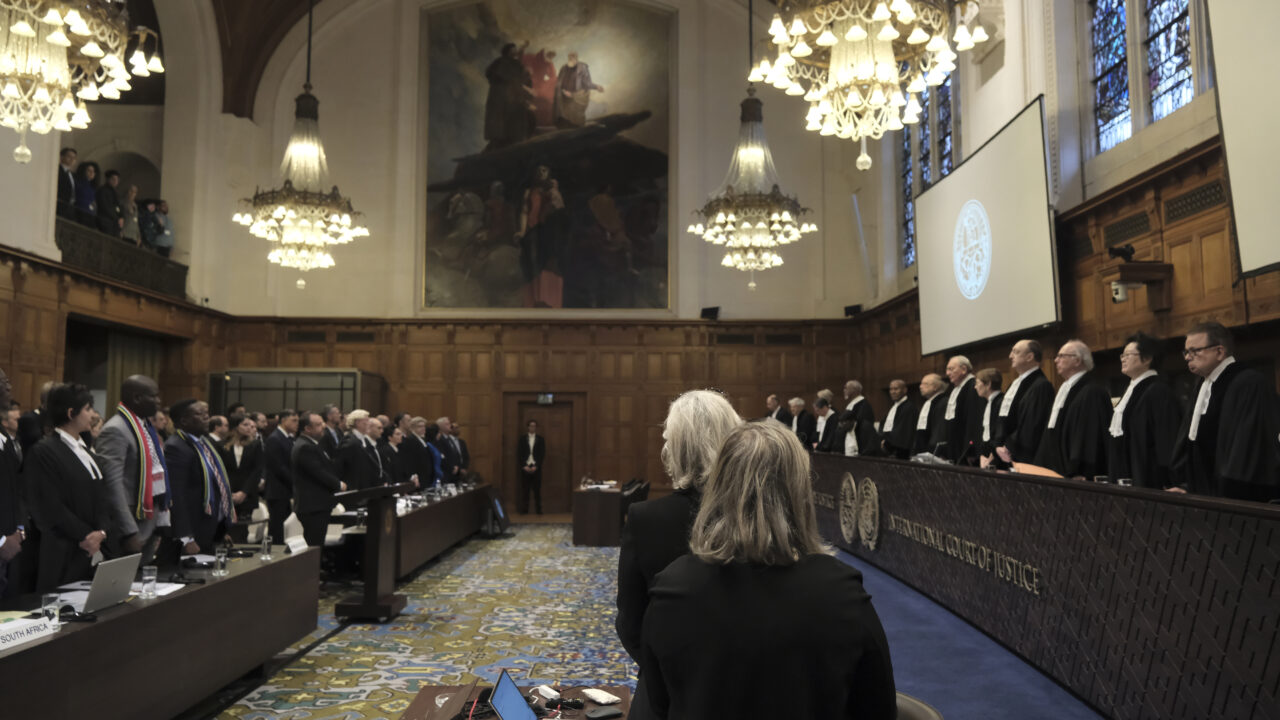 Judges and parties stand up during a hearing at the International Court of Justice in The Hague, Netherlands, Friday, Jan. 12, 2024. (AP Photo/Patrick Post)
Judges and parties stand up during a hearing at the International Court of Justice in The Hague, Netherlands, Friday, Jan. 12, 2024. (AP Photo/Patrick Post)
The world desperately wants an end to the war between Israel and Hamas, and for the moment is focused on South Africa’s genocide suit against Israel at the International Court of Justice. Unfortunately, anyone hoping that the ICJ can meaningfully blunt the carnage is apt to be disappointed. The court lacks the power to halt armed conflicts, and from a purely legal standpoint, South Africa’s case is far from open and shut.
The term “genocide” was coined by Rafael Lemkin, a Polish lawyer of Jewish descent who fled his Nazi-occupied homeland, and after World War II, campaigned relentlessly to gain international recognition of genocide as a new category of crime involving the planned extermination of a nation or ethnic group. Lemkin’s efforts resulted in the 1948 Convention on the Prevention and Punishment of the Crime of Genocide.
Article II of the convention, in the fashion of most modern penal codes, defines genocide as consisting of a physical act and an accompanying mental state. Acts of genocide include killing members of a targeted group; causing serious bodily and mental harm to group members; and inflicting conditions of life likely to bring about the group’s physical destruction “in whole or part.” The mental element requires that the physical acts be committed with the intention of destroying the group “in whole or in part.” In other words, to prove an allegation of genocide, it is not enough to show that large numbers of people have been killed or subjected to cruel and inhumane conditions. It must be shown that the killings and associated harms result from a policy of intentional extermination.
Another section of the convention provides that disputes over genocide “shall be submitted” to the ICJ “at the request of any of the parties to the dispute.” Prior to 2022, South Africa’s claim would likely have been dismissed for lack of standing, since it is not a combatant in the conflict. But in a 2022 case brought by Gambia against Myanmar alleging genocide against Rohingya Muslims, the court determined it had jurisdiction under the Genocide Convention, holding that any state party to the convention can bring a claim against any other party for failing to abide by the convention.
In other words, to prove an allegation of genocide, it is not enough to show that large numbers of people have been killed or subjected to cruel and inhumane conditions.
South Africa filed its complaint — or “Application”, as charging documents are called under the ICJ’s statute and rules of court — on Dec. 29. The country is requesting “provisional measures” — the equivalent of an injunction under U.S. law — declaring that Israel is committing genocide and ordering it to immediately suspend all military operations in Gaza while the case proceeds to a full evidentiary trial at a later time.
South Africa is represented at the ICJ by an able and esteemed team of international lawyers who took full advantage of Myanmar ruling, as well as the ICJ’s internal procedures that give applications for provisional measures expedited consideration. In compliance with those procedures, the court heard oral arguments from South Africa on Jan. 11 and from Israel the following day.
The arguments, livestreamed on UN Web TV, provided a rare public window into the operations of an opaque institution draped in pomp and circumstance that does most of its business behind closed doors and usually proceeds at a snail’s pace.
Also known as the “World Court,” the ICJ sits in the Peace Palace, an immense red-brick neo-Renaissance edifice that opened its doors in 1913 with construction funds provided in large part by Andrew Carnegie, whose eponymous foundation still owns and manages the property. The court is the principal judicial organ of the United Nations and the successor of the Permanent Court of International Justice, which operated under the auspices of the League of Nations from 1920-1945.
Like its predecessor, the ICJ hears disputes between nations. It does not prosecute individuals; that is the mandate of the International Criminal Court, also based in The Hague, which has opened a separate investigation into the war.
The ICJ’s first contested suit involved a 1947 maritime controversy between the United Kingdom and Albania over the Corfu Channel. It has since heard some 192 cases, many involving tedious boundary, aviation and fisheries disputes. Others, however, have addressed grave and solemn issues like the genocide charges brought by South Africa, Gambia and Ukraine against Russia, all of which are pending.
Although every U.N. member is also a member of the ICJ, the court’s jurisdiction is limited by the provisions of the U.N. Charter. It can hear contested cases involving countries that have assented to its “compulsory jurisdiction” or have agreed to submit disputes under the terms of international treaties to which they are signatories. The court also can issue advisory opinions on legal issues at the request of the U.N. Security Council or General Assembly.
Since neither South Africa nor Israel accept the court’s compulsory jurisdiction — only 73 countries do — the Genocide Convention is sole avenue for bringing the case forward. As a result, the scope of South Africa’s case will be confined to the issue of genocide. The court will not adjudicate whether other war crimes have been committed.
The court is composed of 15 judges elected to nine-year terms by the U.N. General Assembly and the Security Council. Joan Donoghue, an American lawyer, has served as a judge on the court since 2010, and was elected as its president in 2021. The other judges currently on the court come from Somalia, China, Slovakia, France, Morocco, Brazil, Uganda, India, Jamaica, Australia, Russia, Lebanon, Japan, Germany and Belgium. In contested cases involving countries that are not represented by judges on the panel, the parties are permitted to add one ad hoc judge each to the bench. Both South Africa and Israel have done so, creating a panel of 17 for the oral arguments.
South Africa’s Jan. 11 oral argument was effective, forceful and emotional. In both its written Application and during its oral argument, the South African team condemned the Oct. 7 attacks on Israel by Hamas and other Palestinian armed groups, but argued (correctly under international law) that no atrocities can justify genocide.
The scope of South Africa’s case will be confined to the issue of genocide. The court will not adjudicate whether other war crimes have been committed.
To prove that Israel had committed acts of genocide, the team documented in excruciating detail Israel’s extensive bombing campaign and ground war that has resulted in the deaths of over 23,000 Palestinians, the destruction of water systems, schools and hospitals, and the forced displacement of 85% Gaza’s residents.
To establish the intent requirement for genocide, South Africa pointed to numerous hate-filled statements made by high-ranking Israeli officials. These included Prime Minister Benjamin Netanyahu’s Christmas message characterizing the war as “a battle of civilization against barbarism” and Israel’s Minister of Defense Yoav Gallant’s Oct. 9 declaration that Israel was “imposing a complete siege on Gaza. No electricity, no food, no water, no fuel. Everything is closed. We are fighting human animals and we are acting accordingly.”
The South African team also emphasized that for purposes of securing provisional measures, it did not have to prove conclusively that Israel had committed genocide, but only had to make a “prima facie” showing that its claims were “plausible.”
In rebuttal, Israel argued that it is not at war with the Palestinians, but with Hamas, the Palestinian Islamic Jihad and other terrorist organizations “whose brutality knows no bounds,” in the words of Tal Becker, the legal adviser for Israel’s Foreign Ministry who opened the second day of hearings.
In one of the proceeding’s most compelling moments, Becker gave a haunting description of the events of Oct. 7, bringing a noticeable hush to the packed gallery inside the grand courtroom:
What proceeded, under the cover of thousands of rockets fired indiscriminately into Israel, was the wholesale massacre, mutilation, rape and abduction of as many citizens as the terrorists could find before Israel’s forces repelled them. Openly displaying elation, they tortured children in front of parents, and parents in front of children, burned people, including infants, alive, and systematically raped and mutilated scores of women, men and children.
Israel is fighting a “war it did not start and did not want,” Becker said. “In these circumstances, there can hardly be a charge more false and more malevolent than the allegation against Israel of genocide.”
Because surrebuttals are not permitted in the ICJ’s provisional hearings, South Africa had no opportunity to respond to Israel’s argument. But there was no denying the damage Israel’s legal team had done, highlighting what could prove to be a fatal flaw in South Africa’s case: the absence of Hamas from the litigation. The ICJ has no jurisdiction over non-state entities like Hamas, which means that any ceasefire the court might order, even provisionally, would be unilateral, applying only to Israel and permitting Hamas to pursue its avowed pledge to annihilate Israel and its Jewish population. Even with a panel staffed by judges from countries unfriendly to Israel, it is unlikely the ICJ will take that step.
This does not mean the ICJ will permit Israel to proceed with the war unsanctioned. The court has discretion to fashion a wide range of interim measures requiring Israel to let more humanitarian aid enter Gaza, refrain from attacking civilian infrastructure and allow independent journalists and human-rights organizations unfettered access to the enclave. It could also order South Africa to use its influence with Hamas to pressure for the release of the hostages abducted on Oct. 7.
The court can and should prescribe these measures, and many others. Even though it lacks the power to enforce its rulings, the court’s decisions carry great moral authority and cannot easily be dismissed or ignored. This is why Israel agreed to participate in the oral arguments, unlike Russia, which boycotted the initial phase of the case brought by Ukraine. As they used to say back in the day, “The whole world is watching.”
Your support matters…Independent journalism is under threat and overshadowed by heavily funded mainstream media.
You can help level the playing field. Become a member.
Your tax-deductible contribution keeps us digging beneath the headlines to give you thought-provoking, investigative reporting and analysis that unearths what's really happening- without compromise.
Give today to support our courageous, independent journalists.
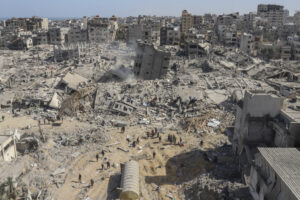
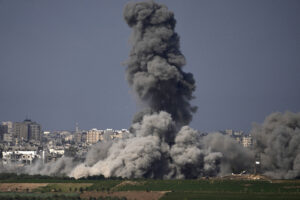
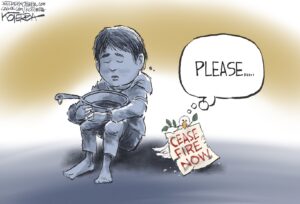
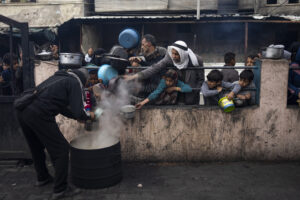
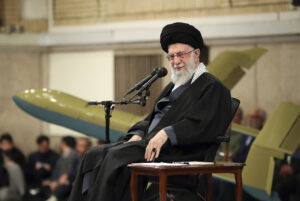
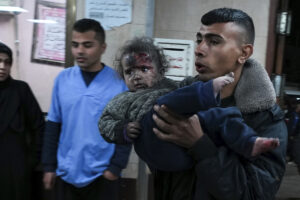
You need to be a supporter to comment.
There are currently no responses to this article.
Be the first to respond.